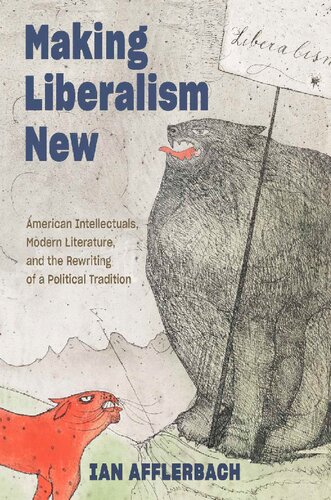

Most ebook files are in PDF format, so you can easily read them using various software such as Foxit Reader or directly on the Google Chrome browser.
Some ebook files are released by publishers in other formats such as .awz, .mobi, .epub, .fb2, etc. You may need to install specific software to read these formats on mobile/PC, such as Calibre.
Please read the tutorial at this link: https://ebookbell.com/faq
We offer FREE conversion to the popular formats you request; however, this may take some time. Therefore, right after payment, please email us, and we will try to provide the service as quickly as possible.
For some exceptional file formats or broken links (if any), please refrain from opening any disputes. Instead, email us first, and we will try to assist within a maximum of 6 hours.
EbookBell Team

4.0
6 reviewsA revisionist history of American liberalism, from the Great Depression to the Cold War.
In Making Liberalism New, Ian Afflerbach traces the rise, revision, and fall of a modern liberalism in the United States, establishing this intellectual culture as distinct from classical predecessors as well as the neoliberalism that came to power by century's end. Drawing on a diverse archive that includes political philosophy, legal texts, studies of moral psychology, government propaganda, and presidential campaign materials, Afflerbach also delves into works by Tess Slesinger, Richard Wright, James Agee, John Dewey, Lionel Trilling, and Vladimir Nabokov. Throughout the book, he shows how a reciprocal pattern of influence between modernist literature and liberal intellectuals helped drive the remarkable writing and rewriting of this keyword in American political life.
From the 1930s into the 1960s, Afflerbach writes, modern American fiction exposed and interrogated central concerns in liberal culture, such as corporate ownership, reproductive rights, color-blind law, the tragic limits of social documentary, and the dangerous allure of a heroic style in political leaders. In response, liberal intellectuals borrowed key values from modernist culture―irony, tragedy, style―to reimagine the meaning and ambitions of American liberalism.
Drawing together political theory and literary history, Making Liberalism New argues that the rise of American liberal culture helped direct the priorities of modern literature. At the same time, it explains how the ironies of narrative form offer an ideal medium for readers to examine conceptual problems in liberal thought. These problems―from the abortion debate to the scope of executive power―remain an indelible feature of American politics.